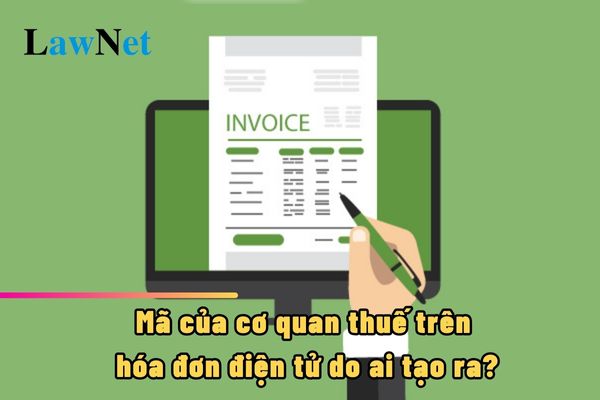Who generates the tax authority’s authentication code on e-invoices in Vietnam?
Who generates the tax authority’s authentication code on e-invoices in Vietnam?
Based on Clause 2, Article 3 Decree 123/2020/ND-CP, it is stipulated as follows:
Terminology Explanation
In this Decree, the following terms are understood as follows:
1. An invoice is an accounting document generated by an organization or individual selling goods or providing services, recording the sale of goods or services. Invoices can be in the form of e-invoices or invoices printed by the tax authority.
2. An e-invoice is an invoice with or without a tax authority’s authentication code, presented in e-data form generated by organizations or individuals selling goods or providing services using e-means to record the sale of goods or services in accordance with accounting and tax regulations, including invoices generated from cash registers connected to the tax authority’s e-data transmission system, in which:
a) An authenticated e-invoice is an e-invoice that has been issued a code by the tax authority before the organization or individual selling goods or providing services sends it to the buyer.
The tax authority’s authentication code on an e-invoice includes a transaction number, which is a unique series of numbers generated by the tax authority's system, and a string of characters encoded by the tax authority based on the seller's information on the invoice.
b) An unauthenticated e-invoice is an e-invoice sent to the buyer by the organization selling goods or providing services without a tax authority’s authentication code.
The tax authority’s authentication code on the e-invoice includes a transaction number, which is a unique series of numbers generated by the tax authority's system, and a string of characters encoded by the tax authority based on the seller's information on the invoice.
Thus, the tax authority’s authentication code on the e-invoice is generated by the tax authority's system.

Who generates the tax authority’s authentication code on e-invoices in Vietnam? (Image from the Internet)
Vietnam: How many characters does the tax authority’s authentication code on e-invoices have?
According to subsection 3, Section IV, Regulations issued with Decision 1450/QD-TCT in 2021, amended by Clause 1, Appendix issued with Article 1 Decision 1510/QD-TCT in 2022, it is stipulated as follows:
- The tax authority’s authentication code on e-invoices is a 34-character string generated uniquely for each e-invoice by the tax authority's system or by a unit's system authorized by the tax authority.
- The tax authority’s authentication code on e-invoices generated from cash registers is a 23-character string structured as follows:
C1C2C3C4C5C6C7C8C9C10C11C12C13C14C15C16C17C18C19C20
In which:
+ The first character C1: is the fixed letter M to indicate the e-invoice is generated from a cash register as stipulated at point b, clause 1, Article 4 Circular 78/2021/TT-BTC.
+ The second character C2: is a fixed character indicating the type of e-invoice from 1 to 6 as stipulated at point a, clause 1, Article 4 of Circular 78/2021/TT-BTC.
+ The third and fourth characters C3C4: are the last two digits of the year the invoice is issued, automatically generated by the seller's sales software.
+ Five characters C5C6C7C8C9: is a 5-character string issued by the tax authority's e-invoice system, ensuring uniqueness.
+ Eleven characters C10C11C12C13C14C15C16C17C18C19C20: is a continuously increasing 11-number string automatically generated by the sales software.
+ The hyphen (-): is the character separating groups of characters indicating the type of invoice, the year of issuance, characters issued by the tax authority, and the continuously increasing number string from the sales software.
The tax authority’s authentication code on e-invoices generated from cash registers can be set for multiple cash registers at one or more business locations, dependent units, ensuring the uniqueness of each invoice.
What are the principles of issuance of the tax authority’s authentication code on e-invoices in Vietnam?
According to Article 90 Law on Tax Administration 2019, it is stipulated as follows:
Principles for generating, Managing, and Using e-invoices
...
4. Issuing the tax authority’s authentication code on e-invoices is based on the information generated by enterprises, economic organizations, other organizations, business households, and business individuals on the invoice. Enterprises, economic organizations, other organizations, business households, and business individuals are responsible for the accuracy of the information on the invoice.
5. the Government of Vietnam provides detailed regulations on this Article.
Thus, issuing the tax authority’s authentication code on e-invoices must be based on the information generated by enterprises, economic organizations, other organizations, business households, and business individuals on the invoice.
Enterprises, economic organizations, other organizations, business households, and business individuals are responsible for the accuracy of the information on the invoice.

